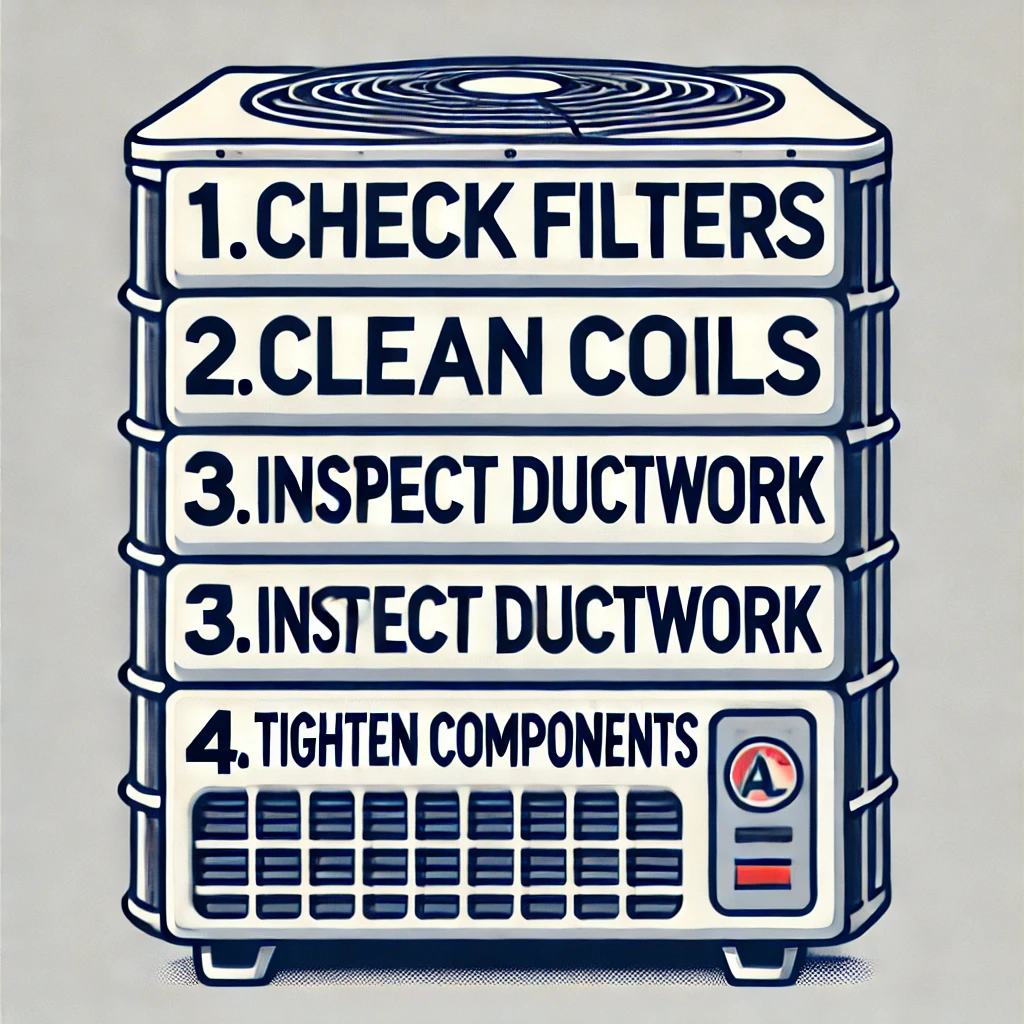Welcome to our HVAC blog! As an HVAC expert, I’m here to help you understand how to perform an HVAC tune-up on your own. Regular maintenance of your HVAC system not only ensures your comfort but also prolongs the life of your unit and improves its efficiency. Here’s a step-by-step guide to help you through the process.
Check out this quick video highlighting some DIY tips for an HVAC tune-up!
Why HVAC Tune-Ups Are Important
Before we dive in, let’s discuss why an HVAC tune-up is crucial. Regular tune-ups keep your system running smoothly, prevent costly repairs, and ensure optimal performance. Here are several reasons why HVAC tune-ups are essential:
- Improved Efficiency: Over time, dust and debris can accumulate in your HVAC system, causing it to work harder than necessary. A tune-up ensures that all components are clean and functioning correctly, which can significantly improve the system’s efficiency and reduce energy consumption.
- Extended Lifespan: Just like any other mechanical system, your HVAC unit will last longer if it’s well-maintained. Regular tune-ups help to identify and address minor issues before they turn into major problems, thus extending the life of your system.
- Cost Savings: While there is a cost associated with regular maintenance, it’s much less expensive than emergency repairs or replacing an entire unit. Tune-ups help to avoid unexpected breakdowns and costly repairs by catching problems early.
- Enhanced Comfort: A well-maintained HVAC system provides better temperature control, ensuring that your home remains comfortable year-round. Whether it’s the heat of summer or the chill of winter, a tune-up helps your system keep up with the demands of the season.
- Better Air Quality: Dirty filters and coils can negatively impact the air quality in your home. Regular maintenance includes cleaning these components, which helps to reduce allergens, dust, and other pollutants, resulting in cleaner, healthier air.
- Safety: An HVAC tune-up includes a thorough inspection of the system, which can identify potential safety hazards like electrical issues or gas leaks. Ensuring that your system is safe and running properly protects your home and family from potential dangers.
- Environmental Benefits: A more efficient HVAC system uses less energy, which not only saves you money but also reduces your carbon footprint. Regular tune-ups help to ensure that your system is running as efficiently as possible, which is better for the environment.
Understanding these benefits underscores the importance of regular HVAC tune-ups. Now, let’s move on to the first step in performing a tune-up yourself.
Safety First
- Turn Off Power: Safety is paramount. Before starting, ensure you turn off the power to your HVAC unit at the breaker box to avoid any electrical accidents.
- Use Proper Tools: Equip yourself with the right tools, including gloves and safety glasses, to protect yourself while working.
Cleaning and Replacing Filters
- Check Filters: Air filters are the lungs of your HVAC system. Check them monthly and replace them if they’re dirty. Typically, filters should be changed every 1-3 months.
- Clean Around the Unit: Make sure the area around your outdoor unit is free from debris, leaves, and overgrown plants. This ensures proper airflow and efficiency.
Inspecting Components
- Thermostat: Test your thermostat to make sure it’s working correctly. If you have an older model, consider upgrading to a programmable thermostat for better control and energy savings.
- Ductwork: Inspect your ductwork for any visible leaks or gaps. Sealing these with duct tape or mastic sealant can improve your system’s efficiency.
Lubrication and Tightening
- Lubricate Moving Parts: Apply lubricant to the blower motor and other moving parts to reduce friction and wear. This step helps maintain smooth operation.
- Tighten Connections: Check all electrical connections and tighten any loose ones. Secure connections prevent operational issues and potential hazards.
Cleaning Coils
- Evaporator Coils: Clean the evaporator coils inside the unit. Dirty coils can reduce efficiency and lead to breakdowns. Use a soft brush or a vacuum to remove dust and dirt.
- Condenser Coils: Clean the condenser coils on the outdoor unit. Gently hose them down to remove any dirt and debris, ensuring the unit can expel heat effectively.
Check Refrigerant Levels
- Refrigerant Lines: Inspect the refrigerant lines for any signs of wear or leaks. Leaking refrigerant not only affects performance but can also be harmful.
- Professional Help: If you suspect your refrigerant levels are low, it’s best to call a professional. Handling refrigerants requires specific expertise and equipment.
Test Your System
- Run a Test Cycle: After completing your maintenance tasks, run your HVAC system through a full cycle to ensure everything is functioning properly.
- Listen for Unusual Noises: Pay attention to any strange noises that could indicate a problem. If you hear anything unusual, it might be time to call in a professional.
Maintain a Regular Schedule
- Bi-Annual Check-Up: Aim to perform a tune-up in the spring and fall to prepare your system for the upcoming season’s demands.
- Professional Inspection: Consider scheduling an annual professional inspection. Professionals can catch issues that might not be apparent to a homeowner, ensuring your system is in top shape.
Conclusion
By following these steps, you can keep your HVAC system running efficiently and effectively. Regular tune-ups are an investment in your comfort and your home’s energy efficiency. If you encounter any complex issues or feel unsure about any step, don’t hesitate to consult with a professional HVAC technician.
For more HVAC tips and expert advice, stay tuned to our blog. Happy tuning!
